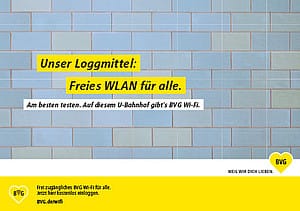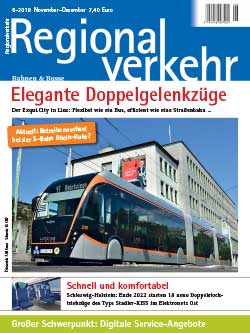Wi-Fi in the stations and vehicles of the BVG
Since 2019, BVG has equipped its bus fleet with this service in addition to its underground stations, and is continuously expanding its overall range.
 Every day and every night, the yellow vehicles of Berliner Verkehrsbetriebe (BVG) are out on the streets of Berlin. In the capital, around 1 billion passengers a year take advantage of the wide range of services offered by Germany’s largest public transport operator. Every year, about 580 million passengers board or change BVG trains at the city’s 173 underground stations.
Every day and every night, the yellow vehicles of Berliner Verkehrsbetriebe (BVG) are out on the streets of Berlin. In the capital, around 1 billion passengers a year take advantage of the wide range of services offered by Germany’s largest public transport operator. Every year, about 580 million passengers board or change BVG trains at the city’s 173 underground stations.
In 2015 and 2016, the underground stations were successively equipped with free WiFi hotspots for commuters and visitors to the city. Since then, the number of users of BVG WiFi at underground stations has risen steadily and is currently in the double-digit millions every month.
The WiFi is also very popular within the vehicles. BVG has been equipping its bus fleet with this service since 2019 and is continuously expanding its overall range in the latest offers such as the ride sharing option “BerlKönig” or mobility hub “Jelbi”. BVG’s WiFi, which commuters and travellers can log on to seamlessly and free of charge, is on the rise in Berlin.
Why WiFi?
 In 2015, at a time when WiFi was still considered rather unusual by public transport companies, BVG broke new ground for passengers with the Europe-wide invitation to tender for its public WiFi. Its stated aim was not only to offer passengers additional convenience with the WiFi service, but also to integrate the WiFi into the increasingly diverse digital service offerings of Berlin’s public transport authorities. These include the BVG smartphone apps with real-time driving information, mobility offers for the urban area and the possibility to purchase digital tickets as well as the continuous renewal of the fleet.
In 2015, at a time when WiFi was still considered rather unusual by public transport companies, BVG broke new ground for passengers with the Europe-wide invitation to tender for its public WiFi. Its stated aim was not only to offer passengers additional convenience with the WiFi service, but also to integrate the WiFi into the increasingly diverse digital service offerings of Berlin’s public transport authorities. These include the BVG smartphone apps with real-time driving information, mobility offers for the urban area and the possibility to purchase digital tickets as well as the continuous renewal of the fleet.
The requirements for the WiFi offer were therefore designed from the outset to accommodate possible extensions. The demand for roaming between underground stations and the automatic connection of passengers to the network offered were two important building blocks for current and future passenger comfort.
It was necessary to activate a youth protection filter at the public hotspots, and the available bandwidths had to be distributed simply and fairly among all users. From the outset, BVG saw not only the advantages for users, but also the possibility of making important products, such as its own ticket app, prominent for passengers through self-promotion on the login pages of the hotspots.
Simple, safe and flexible
Following the invitation to tender, BVG decided to equip the underground stations with the WiFi service from HOTSPLOTS, a Berlin-based WiFi service provider. Today, HOTSPLOTS operates more than 17,000 hotspot locations throughout Europe, including stationary locations such as BVG underground stations, but also an increasing number of mobile hotspots in buses and trains (public transport).
The WiFi services of HOTSPLOTS fully meet the requirements of the BVG. Passengers can easily use BVG WiFi without having to register any personal data: Via a login button, the passengers confirm the terms of use and log directly into the WiFi hotspot with just one click. The period of use or the data volume is not limited in the case of the BVG offer.
Once a terminal device is connected to the hotspot, it automatically reconnects to the return journey at the nearest underground station, when changing trains or when waiting for the train. This automatic login is set up for seven days for BVG passengers. In concrete terms, this means that if a commuter uses the WiFi service every day or several times a week, the login page with the terms of use will actually only be displayed again after seven days without any connection to the BVG hotspots. This convenient function in combination with Berlin-wide roaming via all BVG underground stations, buses and mobility hubs enables surfing in BVG WiFi without restrictions.
The user data of the public WiFi hotspot is routed via highly available, redundant HOTSPLOTS Appliance XL as gateways from the underground stations to the Internet. By means of the VPN protocol developed by HOTSPLOTS, the available bandwidth of the WiFi is distributed fairly in the vehicles and the utilization of the LTE data volume is optimized.
As a WiFi service provider for the BVG, HOTSPLOTS is the service provider through which information is provided to the authorities, for example legal enquiries regarding the misuse of hotspots. Even after the abolition of ‘liability for interference’ in Germany, the legal protection of public hotspots continues to be an important issue. Thus, misuse of a WiFi hotspot in the criminal sense (e.g. dissemination of hateful comments) is not a case that would fall under the purview of ‘liability for interference’. With the enactment of the European General Data Protection Regulation (GDPR), the protection of public WiFi under data protection law has also come to the forefront. In terms of its services, HOTSPLOTS is an advocate for both data economy when it comes to storage as well as adherence to deletion periods. The processing of information requests from end users is also handled by the service provider.
From the station into the vehicles
HOTSPLOTS’ all-round service, with its wide range of technical options and flexible offer for passengers, was a complete success in the underground stations. At the end of 2018, the company therefore began to extend its services to BVG buses.
After the start-up phase with 30 buses, around 300 buses will be running on the highly frequented routes in Berlin’s city centre with WiFi service on board by mid-2019. It goes without saying that the same requirements as those for stationary WiFi apply. All mobile hotspots are correspondingly part of the BVG roaming and the auto-login accesses the end devices, regardless of whether a passenger is travelling in one of the buses or waiting for the subway at a station.
Mobility is changing. This is why the BVG is increasingly testing out new offers. The ridesharing service “BerlKönig” and the mobility hub “Jelbi” are worthy of mention in this context. In the latter case, it is possible to switch between the sharing vehicles of different providers. In addition to rental bicycles or car-sharing vehicles, changing to the bus, tram and underground is also quick and easy. All mobility offers are closely interlinked. Mobility service providers are active via apps and the target group is very online. The further expansion of the free hotspots from train stations and buses to trams and ridesharing as a service for BVG passengers is a logical consequence.
 Complete article in the PDF. (Courtesy of the German magazine “Regionalverkehr”. This text was first published in issue 06/2019.)
Complete article in the PDF. (Courtesy of the German magazine “Regionalverkehr”. This text was first published in issue 06/2019.)



